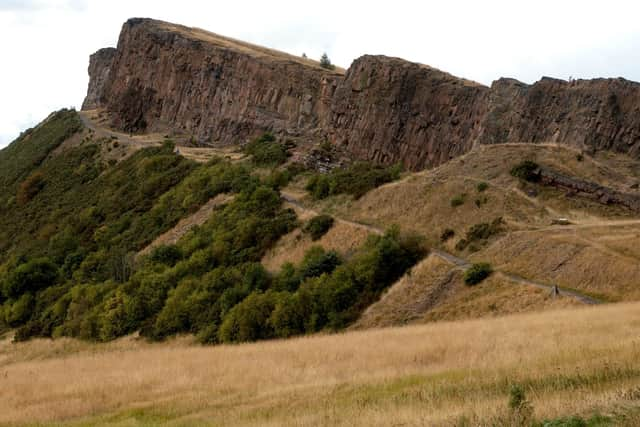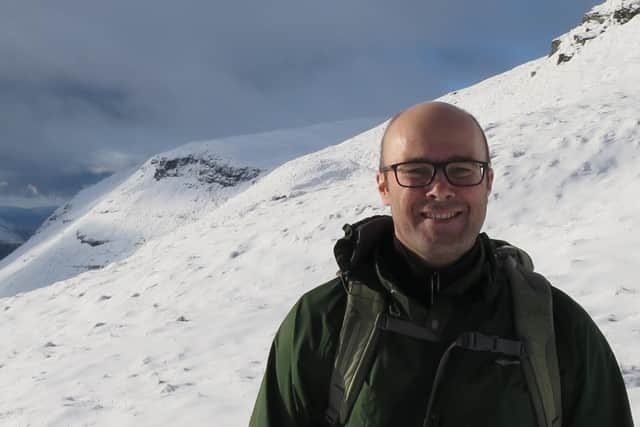Brendan Paddy of Ramblers Scotland on the campaign to reopen the Radical Road: ‘It’s about managing risk’
As director of Ramblers Scotland, Brendan Paddy has now spent the best part of five years campaigning to have the Radical Road on Edinburgh's Salisbury Crags re-opened to the public. In spite of the frustrating lack of progress he has made thus far, however, he is unfailingly polite about Historic Environment Scotland – the body responsible for closing the much loved path and keeping it closed. His responses to my questions are studies in non-confrontational language. He refers to the difficulties he has experienced in securing meetings with HES on behalf of his members as "not [having] had the level of engagement that I would like", and when it comes to the issue of the closure itself, he speaks of his "concerns" about HES's approach to risk. If respect and restraint are the keys to good negotiation, Paddy may yet prevail.
Built by unemployed weavers from the west of Scotland in 1822 at the suggestion of Sir Walter Scott, following the political uprising of 1820 that came to be known as the Radical War, the Radical Road had long been a favourite walking route of locals and tourists alike when it was closed in 2018, following a series of rockfalls. Offering stunning views of the Edinburgh skyline and beyond, up to that point it had frequently featured in guidebooks and lists of "must-see" attractions for visitors to the city. Well-kent fans have included the composer Felix Mendelssohn, who wrote an enthusiastic letter home about it ("Few of my Switzerland reminiscences can compare to this"), and Olympic skier Finlay Mikel, who famously skied off its highest point in November 2009. Furthermore, some of the climbing routes directly accessible from the Radical Road are of major importance to the history of Scottish mountaineering: Harold Raeburn, the so-called father of Scottish climbing, cut his teeth on Salisbury Crags before going on to pioneer classic lines on Ben Nevis, in Glen Coe and beyond.
Advertisement
Hide AdAdvertisement
Hide AdPerhaps most significantly of all, it was partly by studying the so-called “Hutton Section” and “Hutton’s Rock” on the Crags that the Enlightenment scientist James Hutton formulated his groundbreaking Theory of the Earth, which laid the foundations of geology.


For Paddy, however, while the path's history and tourist appeal are undeniable, there's another important reason for reopening it which is frequently overlooked. "Everyone talks about the importance of the Radical Road historically or as a tourist attraction," he says, "but there are some big, poorer communities in this part of central Edinburgh, and this is a really important green space for these people. The impact this can have is really important to the Ramblers, because yes, we want to protect the interests of people who already walk, but for us, people who don't walk or people who face barriers to getting out walking are important too, particularly where those communities are facing really serious health inequalities. There are plenty of barriers already preventing people in these communities from accessing green spaces – we don't want to be adding to them."
In September last year, HES released an Outline Strategic Plan for Holyrood Park, but as Paddy says (in a rare departure from his usually diplomatic tone) "bizarrely, it completely failed to mention the Radical Road issue." In response, Ramblers and other allied organisations created a petition calling for the path to be reopened, and quickly clocked up over 3,500 signatures. As a result, Paddy now at last has a meeting scheduled with HES to discuss the future of the Radical Road. Does he think that perhaps, in these financially difficult times, the projected costs of making the trail "safe" – whatever that means – could be the main stumbling block?
"I'm sure that cost may well come into this," he says, "and if they do have a preferred solution they may have concerns about its affordability. But there's also a concern here for me about their approach to risk and liability. I have to say it feels as if they've adopted a position that means they're just incredibly intolerant of any risk. But I think that part of operating in an outdoor environment is accepting that risks are unavoidable – what you have to do is find proportionate ways to manage that risk, not seek to completely eliminate it.
"I think they've got lawyers in their ears telling them 'You could be sued' and so their response has been to say 'No risk is acceptable', and the only way to create a situation where there is no risk is to completely bar access."


At the risk of stating the obvious, the Radical Road is not the only footpath in Scotland where walkers could potentially sustain an injury, whether that be from falling rocks or simply falling over. However, as Paddy points out, there are certain factors that make it unique: "There are special additional concerns in Holyrood Park," he says. "One, you have very large numbers of people visiting, and two, many of those people are not outdoor people or even Scottish locals who might understand the risks."
"So there is a real issue," he continues, "but I think it cannot be beyond our wit to find a solution that alerts people to the risk, helps manage the risk but also accepts that eliminating the risk isn't realistic. Managing risk is what this is about."
For more on Ramblers Scotland, see https://www.ramblers.org.uk/scotland
